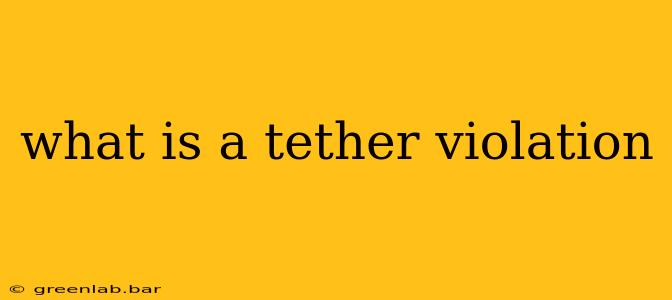A tether violation occurs when someone subject to electronic monitoring, often as a condition of probation, parole, or bail, breaches the terms and conditions of their monitoring agreement. This can encompass a wide range of offenses, impacting the individual's freedom and legal standing significantly. Understanding what constitutes a violation, the potential consequences, and how to avoid them is crucial for anyone placed on electronic monitoring.
Types of Tether Violations
Tether violations are generally categorized into two main types:
1. Location Violations:
These are the most common type of violation and occur when the monitored individual leaves a designated area without permission. This could involve:
- Leaving the permitted area: This is the most straightforward violation – going beyond the geographically restricted zone. The boundaries are usually set electronically and any breach triggers an alert.
- Curfew violations: Failing to return to the designated location by a specific time. This can include being late returning home.
- Unauthorized travel: Traveling outside the specified area without prior approval from the supervising officer. This applies even if the individual is briefly outside the area.
2. Technical Violations:
These violations pertain to the functionality and integrity of the monitoring device itself:
- Tampering with the device: Attempting to disable, remove, or damage the monitoring device. This includes any actions aimed at interfering with the device's accuracy.
- Battery failure: While not always intentional, allowing the device's battery to die can be considered a violation, particularly if it's due to negligence.
- Device malfunction: Although often unintentional, reporting device malfunctions promptly and working to resolve issues is critical to avoiding a violation.
Consequences of a Tether Violation
The consequences of a tether violation can be severe and vary depending on the jurisdiction, the severity of the violation, and the individual's history. Possible repercussions include:
- Revocation of probation or parole: This can result in immediate incarceration.
- Increased jail time: Even a minor violation can lead to additional jail time.
- Increased bail amount: If the tether was a condition of bail, a violation may result in a significantly higher bail amount, leading to continued detention.
- Additional fines: Monetary penalties are frequently imposed for violations.
- Modification of probation or parole conditions: The terms of the supervision might become stricter.
- Damage to reputation and future opportunities: A tether violation becomes part of an individual's legal record, potentially affecting future employment, housing, and other opportunities.
Avoiding Tether Violations
Staying compliant with the conditions of your tether is essential. Here are some key steps to avoid violations:
- Understand the terms: Carefully review the terms and conditions of your electronic monitoring agreement. If anything is unclear, seek clarification immediately.
- Plan your movements: Always plan your trips in advance and obtain necessary permission. Provide accurate information to your supervising officer.
- Maintain the device: Ensure the device is functioning correctly and the battery is adequately charged. Report any technical issues promptly.
- Maintain open communication: Keep open and honest communication with your supervising officer. Report any potential conflicts or issues proactively.
Disclaimer: This information is for educational purposes only and should not be considered legal advice. Consult with a legal professional for guidance on specific situations. The laws and regulations surrounding electronic monitoring and tether violations can vary significantly by jurisdiction.

